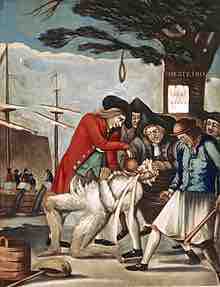Taxation without Representation
"No taxation without representation," a slogan originating during the 1750s and 1760s that summarized a primary grievance of the British Colonists in the 13 colonies, was one of the major causes of the American Revolution . In short, many of these colonists believed that as they were not directly represented in the British Parliament, any laws it passed taxing the colonists (such as the Sugar Act and the Stamp Act) were illegal under the English Bill of Rights of 1689, and were a denial of their rights as Englishmen.

Sons of Liberty Propaganda
The colonists released much propaganda during this time in protest of what they said was unconstitutional policies. Here, Sons of Liberty are tarring and feathering a tax collector.
However, during the time of the American Revolution, only 1 in 20 British citizens had representation in parliament, none of whom were part of the colonies. In recent times, it has been used by several other groups in several different countries over similar disputes, including currently in some parts of the United States (see below). The phrase captures a sentiment central to the cause of the English Civil War, as articulated by John Hampden who said, "what an English King has no right to demand, an English subject has a right to refuse." This tax, which was only applied to coastal towns during a time of war, was intended to offset the cost of defending that part of the coast and could be paid in actual ships or the equivalent value. It was a cause of the English Civil War, and many British colonists in the 1750s, 1760s, and 1770s felt that it was related to their current situation.